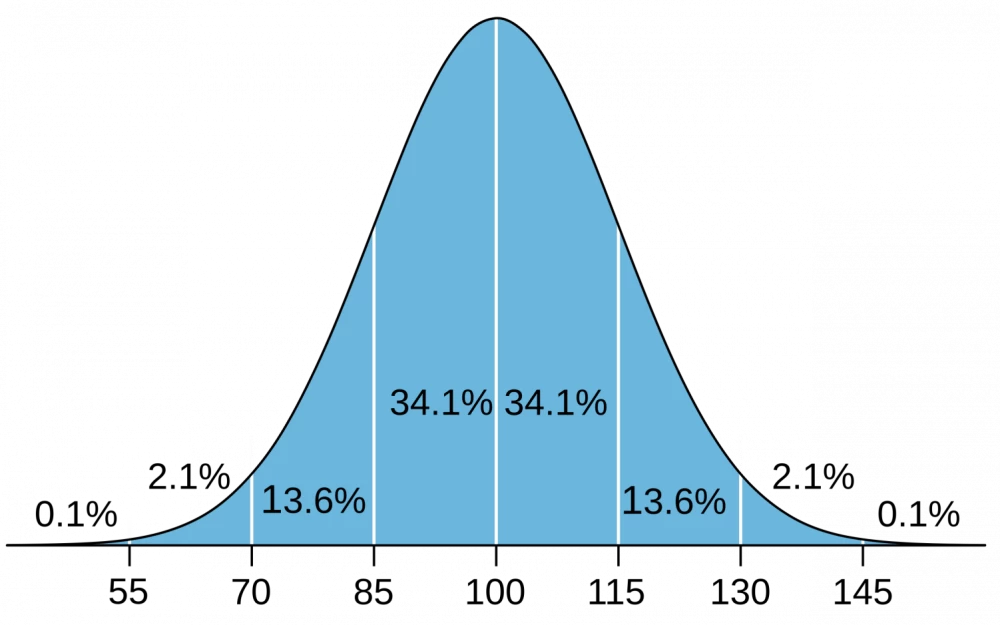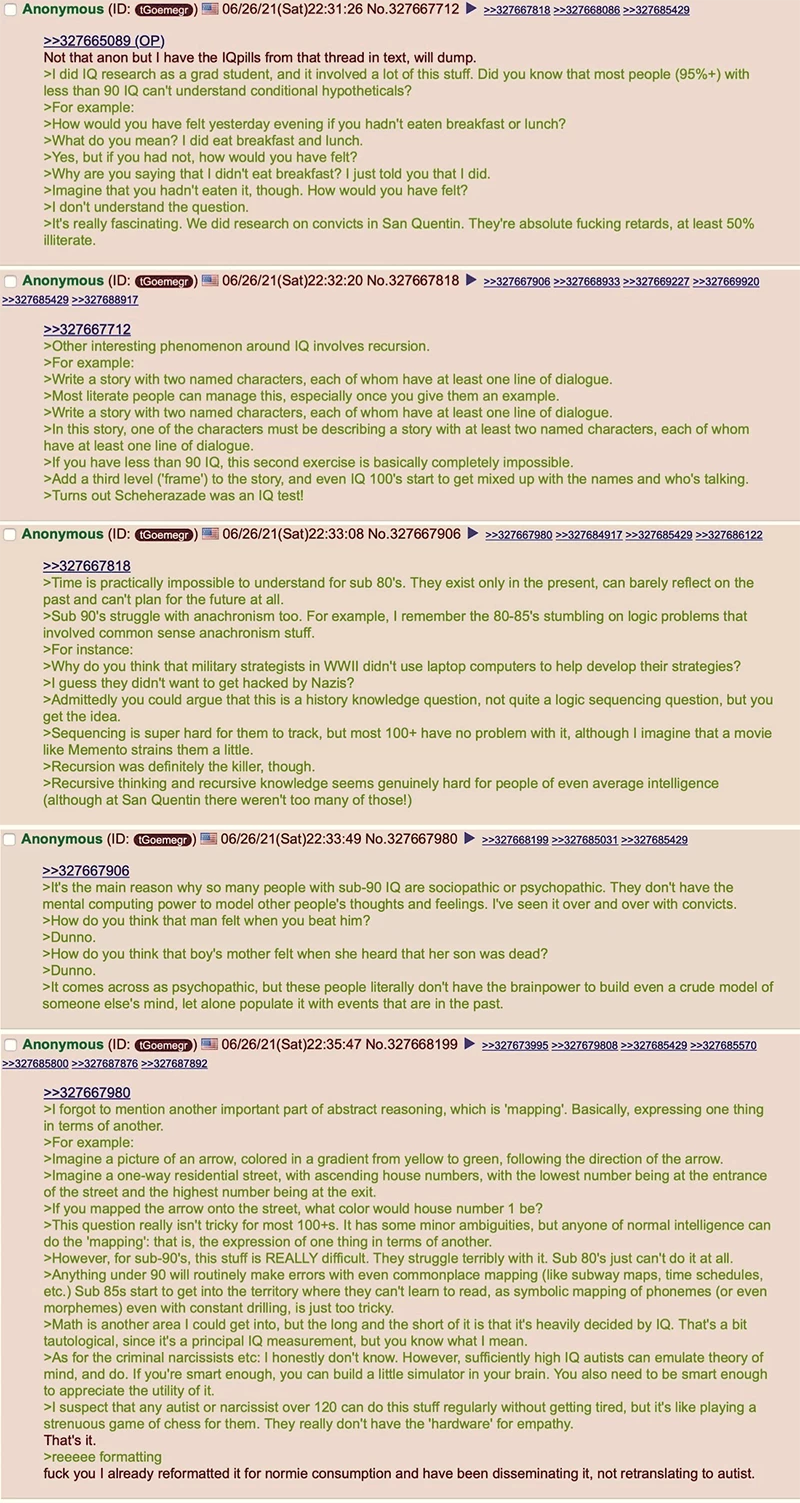- AI
- A
IQ distribution: how a programmer can survive in a world designed for fools?
You have probably often caught yourself thinking that many things in our world are arranged as illogically as possible, and, ideally, should have been arranged completely differently. In philosophy, this problem is often referred to as the actual and the proper. And the way out of it in many cases is not to bring the actual to the proper, but to understand why the actual is the way it is.
Getting rid of the illusions of the ought and understanding the reasons for the being can greatly help you in life, because you will have to work with the being, not with fantasies about the ought. And when fantasies about the ought break against the wall of the being, it can be very, very painful for the bearers of these fantasies. The most effective way to understand the being, I believe, is to watch TV shows about the world of wild animals tearing each other's throats for food, in which you can easily recognize the human world. But this post is not about that.
In this post, I want to consider a question, the answer to which, I hope, will help you understand why many things in the world are arranged the way they are. Why are many laws so illogical? Why are the films shown in cinemas so simple, and masterpieces always fail at the box office? Why is "safe account" fraud still so widespread if it is talked about at every turn? Why is it so important in the US who Taylor Swift supports in the elections? Why does the Flat Earth Society exist? Why does the police work the way it does? However, I will not directly consider any of these questions, but I will only consider the meta-question, the meta-answer to which silently answers them all.
IQ Test
Standardized tests for measuring human intelligence spread in the early 20th century with the beginning of widespread industrialization and the emergence of mass armies. Employers needed to identify the most intelligent workers who could work with complex drawings and on complex machines. And the armies did not want to waste soldiers' lives in vain - why send a smart soldier to storm an enemy machine gun when he would be much more useful working as a signalman at headquarters?
Modern standard IQ tests usually go like this: a large sample of people, many thousands or even tens of thousands, solve dozens or even hundreds of logical puzzles. The results of correctly solving the problems with a sufficiently large sample always correspond to a normal distribution. These results are normalized so that the middle of the distribution is taken as the number 100, and the standard deviation is taken as the number 15. Thus, the IQ distribution always looks like the picture under the title of this post.
There is a simple mathematical fact that is hard to disagree with - half of the values in a normal distribution are below average. From which follows another fact, mathematically completely equivalent to the first, but described in other words - half of the people are dumber than average. However, agreeing with this second fact is psychologically very uncomfortable - it always seems to us that all people think roughly the same way as we do. Unfortunately, it is the complete realization and acceptance of this fact that is the very path to getting rid of illusions about what should be and accepting what is.
Very often, we, programmers, live in a bubble, among the inhabitants of which the average IQ is much higher than the average 100 points. Our circle of communication is limited to our colleagues from IT companies, fellow students in the physics and mathematics departments of universities, often classmates in specialized schools, most likely fairly well-educated parents and relatives, and so on. We do not like to get out of this "nerdy" bubble, and such cocooning often leads to a strong distortion of the picture of the world, because of which we are sincerely surprised why some things are arranged the way they are. We look around us, and it seems to us that all the people around us think approximately the same way as we do - not in terms of political or any other views, but in terms of the level of argumentation and logical thinking.
But if you look closely at the graph of the distribution of intelligence in the population, you can see that almost 16% of the population has an IQ below 85 points, and 25% below 90 points (including the previous 16%, of course). And to understand reality, it is important to understand what this actually means.
Abilities depending on IQ
On the internet, you often come across a screenshot of a thread from 4chan, in which the author writes about the simplest and fastest IQ test that can be done without much effort:
The simplest and quickest way to test the intelligence of your conversation partner is to mention a generalized statement about a group, like "on average, Asians are shorter than Europeans." If your conversation partner responds with something like "not all Asians are short" or "I know a tall Asian," it indicates that they have a relatively low IQ. With their response, they demonstrate a lack of understanding of abstract concepts such as "statistical averages" or "per capita." No arguments or explanations will be able to convince them because they simply do not grasp abstractions.
In another fairly well-known thread on 4chan, popular in the English-speaking internet, the author talks about his participation in scientific IQ research:
In my student days, I participated in conducting IQ tests and saw a lot of things. Did you know that most people with an IQ below 90 are incapable of understanding hypothetical situations?
For example, a dialogue with one of the subjects:
- How would you have felt last night if you had missed breakfast or lunch that day?
- What do you mean? I had breakfast and lunch yesterday.
- Yes, but if you hadn't, how would you have felt in the evening?
- Why are you saying I didn't have breakfast? I said I had breakfast.
- Imagine you missed a meal yesterday. How would you have felt last night?
- I don't understand the questionWe conducted an intelligence study at San Quentin prison among inmates. Most of them had very low IQ scores, and half were almost illiterate.
Another interesting phenomenon is related to recursion. For example, if you ask a subject to write a story with two named characters, each of whom has at least one line, most literate people can easily handle this task. Especially if you give them an example. But if you ask them to write a story with two named characters, each of whom has at least one line, and one of whom tells a story with two named characters, each of whom has at least one line, most people with an IQ below 90 cannot handle it. Add a third level of recursion, and even people with an IQ of 100 will start to get confused with the names.People with an IQ below 80 have difficulty understanding the concept of time. They do not think about the past or the future, but live in the present moment. People with an IQ in the range of 80-85 often stumbled on logical tasks related to understanding anachronisms. For example, when asked "why do you think generals did not use laptops to plan military strategy during World War II," many answered "maybe they were afraid that Nazi hackers would hack them." Of course, you could argue that this is a question not of logic but of knowledge of the history of technology development, but I hope you get the point. Subjects with an IQ in this range had great difficulty tracking the sequence of events, while subjects with an IQ above 100 did not have such problems. But the main dividing line is still the understanding of recursion - even most people with average intelligence have great difficulty with recursive thinking.
Although there were few such people in San Quentin prison. Mostly, there were people with an IQ below 90 who had problems with psychopathy and sociopathy. They did not have enough cognitive computational power to calculate other people's reactions to their actions. For example, a dialogue with one of the subjects:
- How do you think this person felt when you beat him?
- I don't know
- How do you think this boy's mother felt when she heard that her son was dead?
- I don't know
You might think they just don't want to answer, but in fact, these people lacked the intelligence to even build a rough model of another person's mind, let alone fill it with events from the past.
I forgot to mention another important part of abstract thinking - understanding correspondences and mappings. Essentially, expressing one thing through another. Here is an example of one of the tasks: "Imagine an arrow painted in a gradient from yellow to green in the direction of the arrow. Imagine a one-way residential street with increasing house numbers, where the smallest number is at the entrance to the street, and the largest is at the exit. If you placed the arrow on the street, what color would house number 1 be?"People with an IQ above 100 have no difficulty with this task. Any person with average intelligence can map one thing onto another. However, people with an IQ below 90 have great difficulty with this task, and people with an IQ below 80 are generally incapable of completing it. People with an IQ below 90 have constant difficulties in life with reading maps and schedules, and people with an IQ below 85 often have problems even with basic literacy, because reading is mapping letters to sounds.
And I'm not even talking about mathematics, although mathematics is an area where success is largely determined by the level of intelligence. You could say this is a tautology, as the level of intelligence is tested by mathematical-logical tasks, but you get the point.
If the anons from 4chan do not seem to you to be sufficient authorities, let's turn to an interview with the Russian popularizer of mathematics Alexey Savvateev, in which he talks about the fact that already in the early grades of school, it is possible to understand from a child what abilities he will be able to master and which ones he will not, giving an example of three major watersheds that not everyone can overcome.
The first watershed is at the stage of about three to four years and shows the presence of abstract thinking: if you ask a child how much it will be if you add two oranges to three watermelons, some children will immediately answer that five, and some will not understand the question because they cannot abstract the number from the essence. The second watershed is at the stage of the third-fourth grade of school, in which they begin to teach mathematical functions like
If in the near future an AI with intellectual capabilities exceeding the abilities of the smartest people appears, then even if it creates new theories of physics and writes proofs of the most complex mathematical hypotheses, it will probably simply not be able to explain them to anyone, because even the smartest people will not have enough intelligence to understand them. Given that a fairly large part of the human population has problems understanding the functional dependence of x on y, this is not hard to believe.
Conclusion
Before you rush to the comments shouting "Hitler! Hitler! Hitler!" please reread the post. There are no calls for violence based on IQ or anything of the sort. This post doesn't contain anything prescriptive—it's entirely descriptive.
Afterword
Recently, I gave in and created my own Telegram channel, where I post announcements of my new posts from various platforms and podcasts that I record together with the Univers community. If you’d like to read, watch, and listen to me there, and not just on Tekkix, you’re more than welcome to join.













Write comment